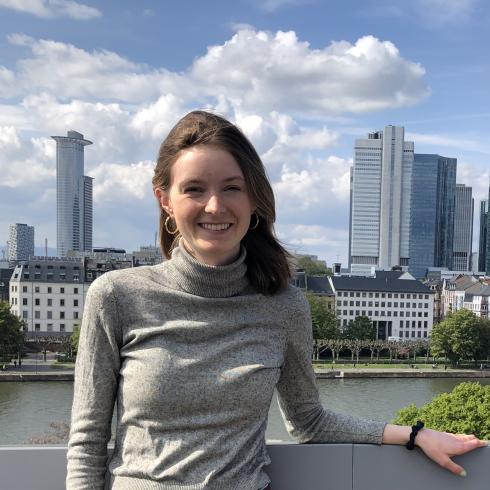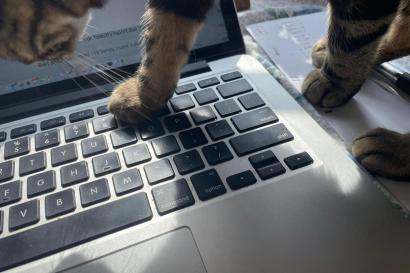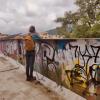It’s funny to think how profusely I’ve written about not traveling, and, yet, many of these essays I have, in fact, written while traveling. I’m doing that now: traveling, and writing, and I haven’t properly slept for over 24 hours. I’m in the Frankfurt airport, and I have been here for exactly six and a half hours. I generally do not give this much time for a flight, even an international one, but I was at the mercy of the Deutsche Bahn, which left Freiburg at five minutes past midnight in the witching hour between Tuesday and Wednesday, and Wednesday morning at seven something. The plane takes off five minutes before eleven, so I took the midnight one and caught an odd hour of sleep here and there with my face pressed to my backpack and my cellphone on constant “wake me up in one hour” mode.
Now I’m in Dublin. I’ve left German soil, I’ve ordered my first cappuccino (necessary, despite the airport premium) in English since February.
In my last essay I wrote about the bitterness of departure. In this one, I’m writing about the sweetness of it. Or rather, I’ll embark on a summary of the chaos that has, rather unfortunately, tinged the last few weeks of the, as yet, most remarkable half year of my life. I do this not to cast Freiburg, the university, or the experience of studying abroad, in poor light, but rather as an assurance that, despite all, you can—and will—be alright.
I’ll begin with what I recognize as, indeed, the beginning of my “Verletzungspech” (streak of bad luck).
On Sunday, the 30th of May, I boarded a tram in Basel without paying a ticket. It’s a habit of mine—a bad one—not to pay a ticket, because I only ever use the tram in Freiburg after 7 P.M. or on Sundays when it is free for students with an ID card. I did not, however, consciously neglect to pay a ticket. I simply walked on the tram without thinking (it was very early and I had had limited sleep the night before) and faced, as karma would dictate, my first ever tram ticket control, for which I received a 100 CHF (Swiss Franc) fine. My one satisfaction, though not quite a consolation, was that the controller did not once switch to English—even after I tried to pull the naive one-semester exchange student excuse.
I made it through most of the following week without error, though by this time I had started to panic about my upcoming exam for my university course, Einführung in die Literaturwissenschaft. I had also learned that I could not remain in my room following the 20th of July, the final day of IES Abroad scheduled internship period. I would need to find my own place to stay in order to remain in the city for my exam, which was to take place on July 23rd.
On Saturday however, two things happened. I lost the key to my apartment—it was the only key I lost; it simply vanished from my key ring—and I got a flat tire. I walked home pushing my bike in the rain and the dark after closing the exhibit at the Literaturhaus (more on this in my upcoming essay), keyless, bikeless and soaked. Fortunately, I had roommates.
On Monday, I swallowed my pride and shared my woes with Karin Jors, the Health and Safety Coordinator of the IES Abroad Freiburg contingent. In truth, I went through several soaked tissues while doing so. Karin was so kind, so determined to help me work through my plight(s), that I’m afraid I wept harder out of gratitude.
On Tuesday, I learned that I could not, in fact, take the exam on any day later than the 19th of July. I spent much of this week navigating this new challenge. In short: the program would not accept a grade from the university for an assessment that fell after the lecture period. The university, however, would not allow me to take the exam during the lecture period. If I did not take the exam, or if I took it on the scheduled day (after the lecture period) the program would be required to write a fail in my transcript. And I couldn’t simply drop the course because I needed the credit to satisfy the program’s semester requirements. The difference was, as I discovered, a single ECTS point (German university credit system). There was a solution: the university offered to simply give me a “pass” (the logic being that I had completed all the required lecture work, attended every class, engaged actively in discussion, and visited regular office hours). IES Abroad approved this. My home college did not. I needed a grade. I was afraid even if I wrote the exam, I would fail anyway. Skip a few headaches later…and the university, the program, and my home college arrived at an agreement: I could take the exam as usual on the 23rd of July. I rejoiced, and I panicked. I spent eight hours in the library every day for a week and a half.
On Thursday, I booked an Airbnb with the understanding that I could no longer remain in my apartment after the 20th. The booking was inexpensive: a super host, with good reviews. A convenient location with respect to the university.
On Friday, I bid farewell to my pothos plant. The little green thing I bought at Ikea months ago, that turned into something not so little and so rich and full of life. I packed my room into a suitcase, and a cardboard box, and a backpack, and the seams of my violin case.
On Saturday, I wrote an email to my Airbnb host to say I was about to leave my apartment and cross the city to her place. I would arrive before 11 A.M., as she requested. I carried my suitcase, my box, my violin, and my backpack down the stairs, to the tram, to the connecting tram, and 15 harrowing minutes of stop-starting while I massaged my arms, my shoulders, my knees, my hands. I arrived at the Airbnb at 10:37 A.M. I checked my email. Six new messages. “I am angry” said one. “You are disrespectful” said another. “I am going to miss my train,” said a third. “I see that you are deeply irresponsible,” said a fourth. I was shocked. And I was confused. I had arrived at the time I predicted I would—albeit several minutes later, with aching muscles and dizzy from the heat and the exertion. “I am sorry,” I tried. “The journey took longer than expected. I am here now.” I can’t remember what she said then, and I am afraid to check the message history. I remember I included in a later message that I have a chronic illness which makes carrying so many things and walking far difficult. I don’t like to use this as an excuse, but I wasn’t sure what else I had to say. “Disrespectful.” “Irresponsible.” “Angry.” “If I had known, I would never had hosted you.” I texted my friend who lives in Dortmund. I couldn’t call my parents—if they were awake, I wouldn’t have cared that calling them would disprove my independence. It was four in the morning there. My friend suggested I try the Airbnb hotline. I did, and I was overwhelmed by the kindness of the woman who answered. She told me not to worry, pause, drink some water, and she will help me find a new place to stay. I’ll skip some details here, but the moral is—Airbnb not only gave me a full refund, but a $200 bonus on my next booking. They didn’t mind my sobbing on the phone. They listened, they believed me, and they helped me work through a solution. I returned to my apartment after another harrowing journey of aching muscles, heat and heavy baggage. I dropped my suitcase and my box and my violin and my backpack on the floor as soon as the door closed behind me and sank on the couch, again, in tears. My roommate found me immediately and knelt down next to me and told me it was alright and said quiet, comforting things and offered me her leftover noodle salad because, at this point, I had no food left in the refrigerator or in the cupboard I had occupied for the semester. My other roommate offered her bed, because she was at the time away with her basketball team in Hungary. All of my roommates acknowledged the bizarreness of this experience with the host, and welcomed me back to the apartment with open arms.
On Sunday I had to give up my key. My new key—the one I had to buy just over a week ago after my first one disappeared.
On Monday I didn’t think about anything except my exam.
On Tuesday, I took my exam. I answered every question. I did it. I took a literature exam in German. A famously difficult exam for native German speakers. The relief I felt when it was finished was, well. Indescribable. And the accomplishment.
In Einführung in die Literaturwissenschaft, the lecture for which I wrote this fated exam, we learned about Aristotle’s requisite effects of tragic theater. Eleos (Jammer: “misery”), Phobos (Schaudern: “to shutter,” or “to shake”) and Katharsis (Reinigung: “catharsis”). This is my Katharsis.
I still shed a tear or two as I pedaled through Freiburg yesterday afternoon, the final journey on my run-of-the-mill and yet all-the-more beloved bike, closed the door to my favorite bookshop—Jos Fritz—for the last time, and finally watched the city blur past in great dark midnight streaks, listening to the rattling of the rails and the casual (unknowingly blissful) conversation of passengers who are not going anywhere, or leaving anywhere, of an ocean-length and thousand euro plane ticket significance. I will miss Freiburg with an ache that will not go away until I can return.
In the meantime, I look forward to a long break. From carrying things, from studying poetry, from thinking. With that, I’ll board my next flight.
Until the next (and much more optimistic), C.

Carolina Weatherall
I like telling stories and writing long-winded essays about my cultural observations. I generally wind up where there are books, or people talking about them, or—better yet—people celebrating queer, feminist or minoritized voices in twenty-first literature.






